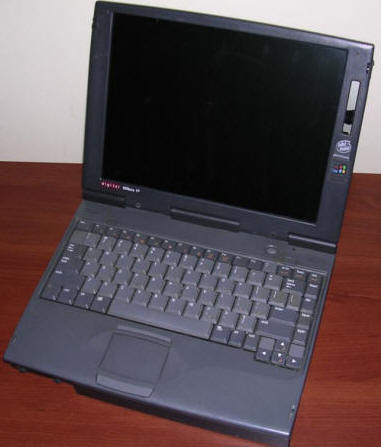DEC HiNote VP
Another PC notebook from DEC, this unit has Pentium 133MHz processor and 8MB On-board RAM expandable with SIMMs up to 40MB (although 16MB SIMMs of this type were quite rare). It's typical construction of mid-90s with modular technology and replaceable drive bay.
| Manufacturer | Digital Equipment Corp | |
| Origin | USA | |
| Year of unit | 1996? | |
| Year of introduction | 1995?96? | |
| Type | Laptop, PC | |
| CPU | Intel Pentium 133Mhz | |
| RAM | 16MB (8MB onboard + 2x SIMM EDO 3.3V) | |
| Floppy Disk | Removable 3.5" 1.44MB in a bay | |
| Hard Disk | Originally 540 or 810MB ? | |
| Other media | Drive bay to connect other drives instead of FDD. | |
| Graphics and display: | 800x600 color LCD (16-bit color supported). | |
| Sound: | PC Speaker, sound card (?) |
|
| Keyboard and pointing device: | Small PC keyboard with numerical
pad on letter keys. Touchpad with 2 buttons. |
|
| OS: | Windows 95 | |
|
Power supply:
1 - Ground |
||
| I/O: | - Serial port - Parallel port - VGA video out - Dock connector - PS/2 - 2x PCMCIA - Sound I/O. |
|
| Possible upgrades: | RAM, CPU is replaceable but I don't know about other modules. | |
| Additional peripherals: | None |
My unit has no HDD nor HDD container with ribbon cable so I can't run it easily. It is in very poor condtion, indicator is shattered and case is scratched, but it works enough to run BIOS and boot system from floppy disk.
It's a normal PC notebook, it has Phoenix BIOS from ~1995 and it should boot to OS normally.
About BIOS battery... It is, and it usually doesn't leak.
But if notebook was kept in humidity it may oxidize. To access
battery:
1. Remove 2 clips above keyboard by prying them off from their top edge.
Remove keyboard screws.
2. Open keyboard towards you, slide out, then towards LCD. Be careful
about ribbon cable.
3. Remove 2 heatsink screws. Pry heatsink off starting from lower-right
edge, it's glued to CPU by thermal grease.
4. Battery, 3V, is right near touchpad, wrapped in some kind of paper
tape. + is upper-right, - lower-left of frame painted on PCB
5. About re-assembly: If you've disconnected keyboard by accident, it's
a ZIF connector on small hinges, open rear towards you, close towards
LCD. It's easier to connect it and close it BEFORE mounting heatsink.
|
|
User's manual |
|
|
User's manual addendum |
|
|
Technical manual |






